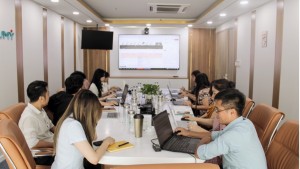Petrovietnam – A New Aspiration in Nuclear Power Development
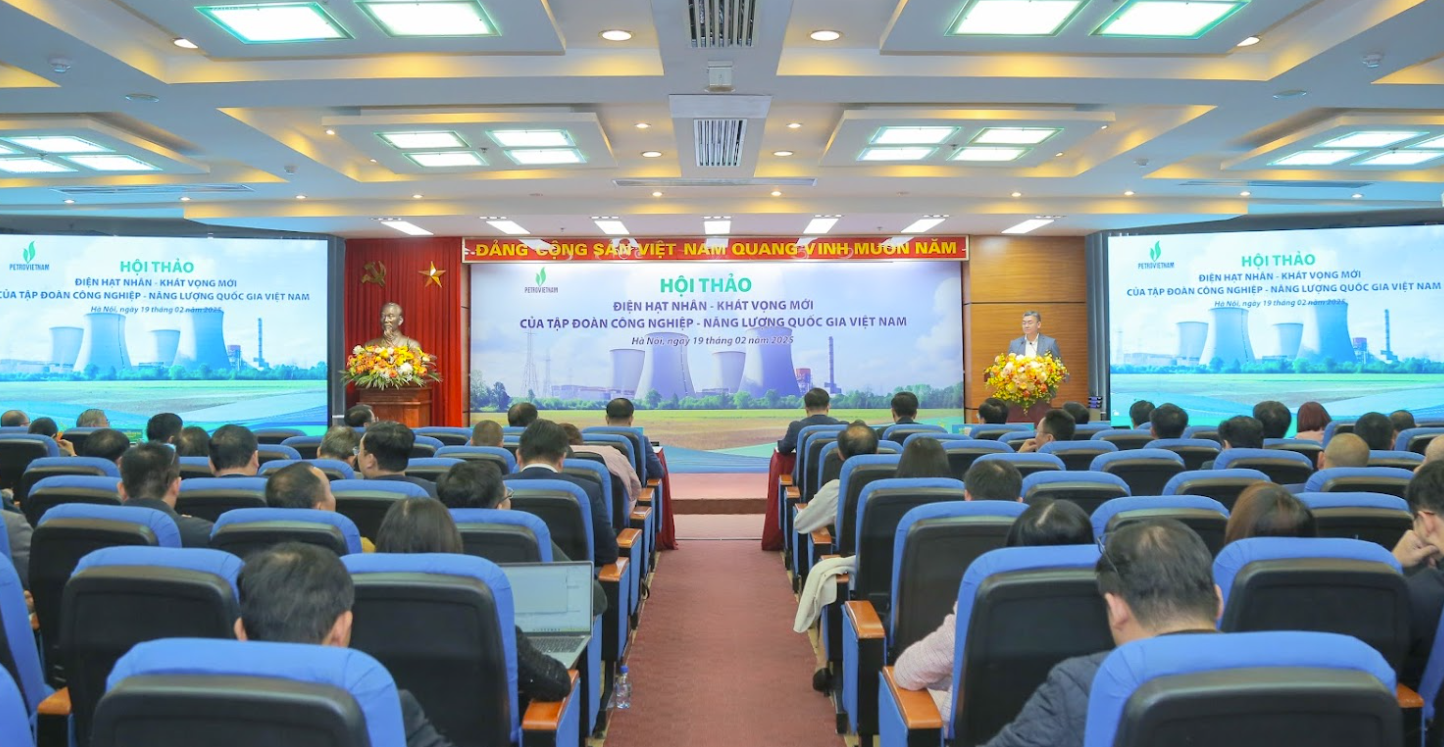 |
| Nuclear Power Conference – New Aspiration of Vietnam Oil and Gas Group, February 19th |
The conference saw the participation of Dr. Tran Chi Thanh, Director of the Vietnam Atomic Energy Institute; Dr. Le Van Hong, former Deputy Director of the Vietnam Atomic Energy Institute; Dr. Hoang Anh Tuan, former Director of the Atomic Energy Department (Ministry of Science and Technology); Assoc. Prof. Dr. Nguyen Van Thai, Deputy Director of the Institute of Technical Physics, Hanoi University of Science and Technology; along with leading experts from the Vietnam Atomic Energy Institute.
Representing Petrovietnam were Chairman of the Board of Directors Le Manh Hung; General Director Le Ngoc Son; Deputy Secretary of the Standing Party Committee Tran Quang Dung; members of the Standing Committee, Board of Directors, Board of General Directors; and representatives of leaders from professional departments and units within the Group.
Nuclear Power – The Key to Achieving Net Zero
At the conference, experts concurred that nuclear power is the most viable solution amid climate change and the ongoing energy crisis. This energy source will become increasingly significant and experience strong growth in the near future, playing a crucial role in ensuring energy security. Nuclear power currently has the lowest emissions among all major energy sources, including renewables, generating a large, stable electricity supply well-suited for today's energy demands, particularly in achieving the Net Zero target.
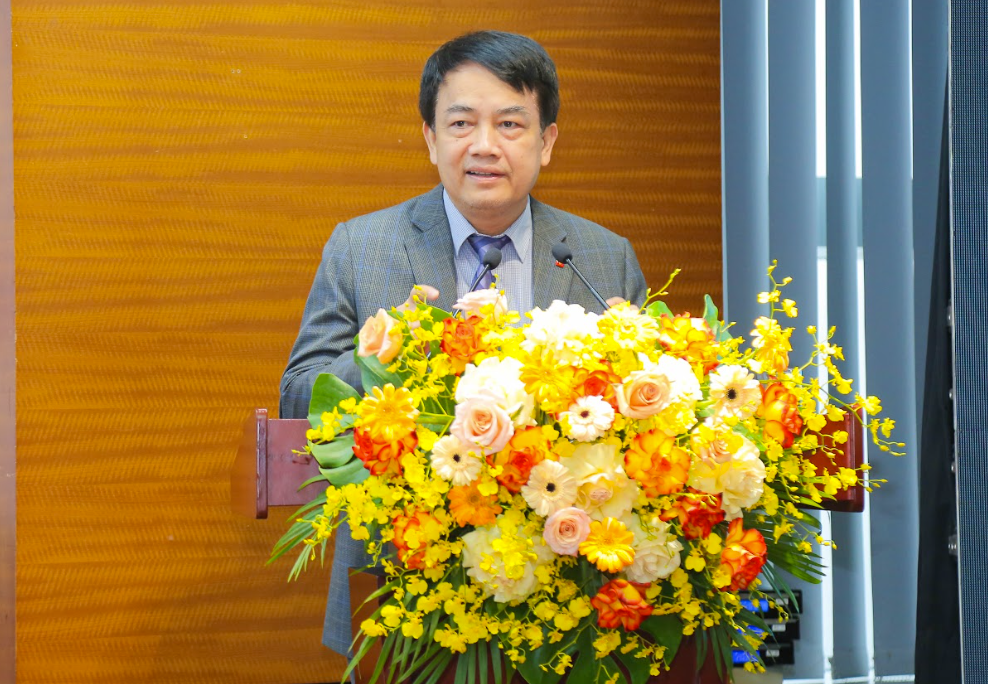 |
| Dr. Tran Chi Thanh, Director of the Vietnam Atomic Energy Institute, proposes amending the Law on Atomic Energy to the nuclear regulatory system |
Drawing from international experiences, Dr. Tran Chi Thanh emphasized the three pillars of nuclear power: power plants, nuclear regulations and safety, and research & development. In Vietnam, President Ho Chi Minh visited the Obninsk Nuclear Power Plant (Soviet Union) in July 1955, paving the way for nuclear power research in the country. Subsequently, Vietnam had a nuclear power development program decades ago and actively implemented it from 1996 to 2016, with results that remain valuable.
"Vietnam is currently making efforts to implement nuclear power projects in Ninh Thuan, having designated sites, established a regulatory system, and trained a nuclear workforce. We must urgently continue the progress made before 2016 because nuclear power development requires a long timeframe. Among the key factors for success, human resources are crucial, and completing the necessary infrastructure - particularly enhancing the nuclear regulatory system through amendments to the Law on Atomic Energy - is an essential task," recommended the Director of the Vietnam Atomic Energy Institute.
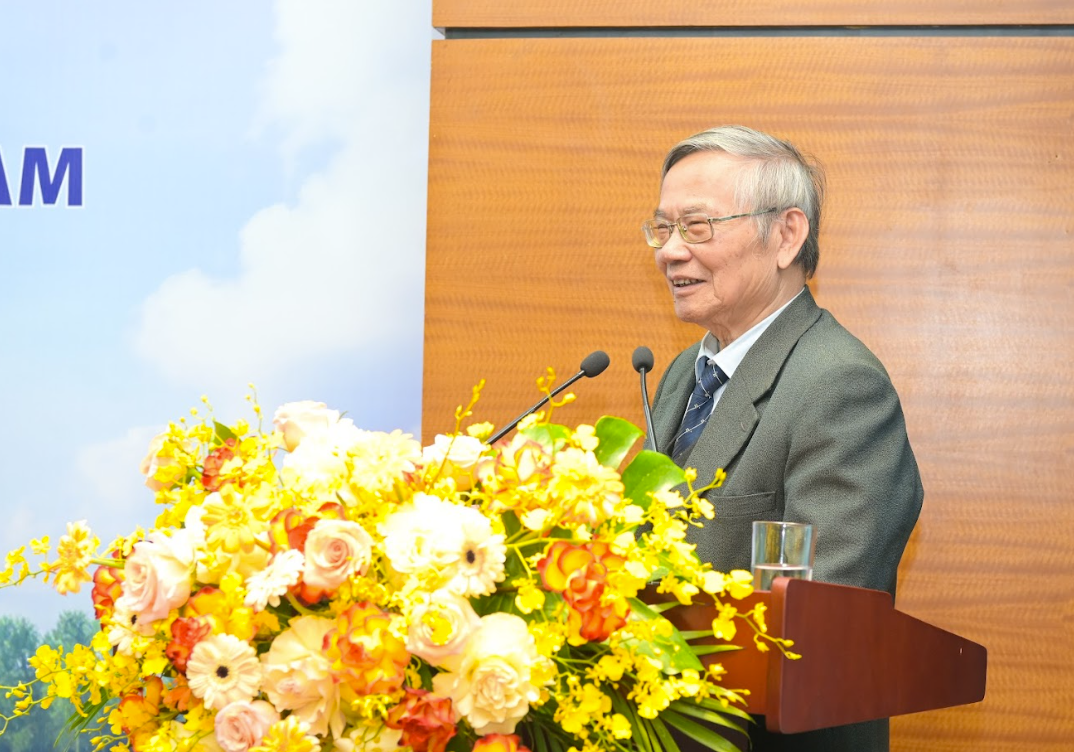 |
| Comparing the schematic diagram of a nuclear power plant, Dr. Le Van Hong, former Deputy Director of the Vietnam Atomic Energy Institute, noted similarities with the thermal power plants previously built by Petrovietnam. |
Elaborating on the current generations of nuclear power technology, Dr. Le Van Hong stated that nuclear power technology is now advancing at its highest level. Comparing the schematic diagram of a nuclear power plant, Dr. Le Van Hong highlighted similarities with thermal power plants that Petrovietnam has previously developed, presenting an advantage for the Group should it be assigned as the project owner.
Another crucial topic addressed at the conference was the infrastructure and legal framework for nuclear power plant construction. According to M.A. Nguyen An Trung, Acting Head of the International Cooperation Department, Vietnam Atomic Energy Institute, the construction of a nuclear power plant must adhere to intergovernmental agreements, international conventions and treaties, as well as domestic legal frameworks, including Laws, Decrees, Prime Minister’s Decisions, Circulars, and National Technical Standards.
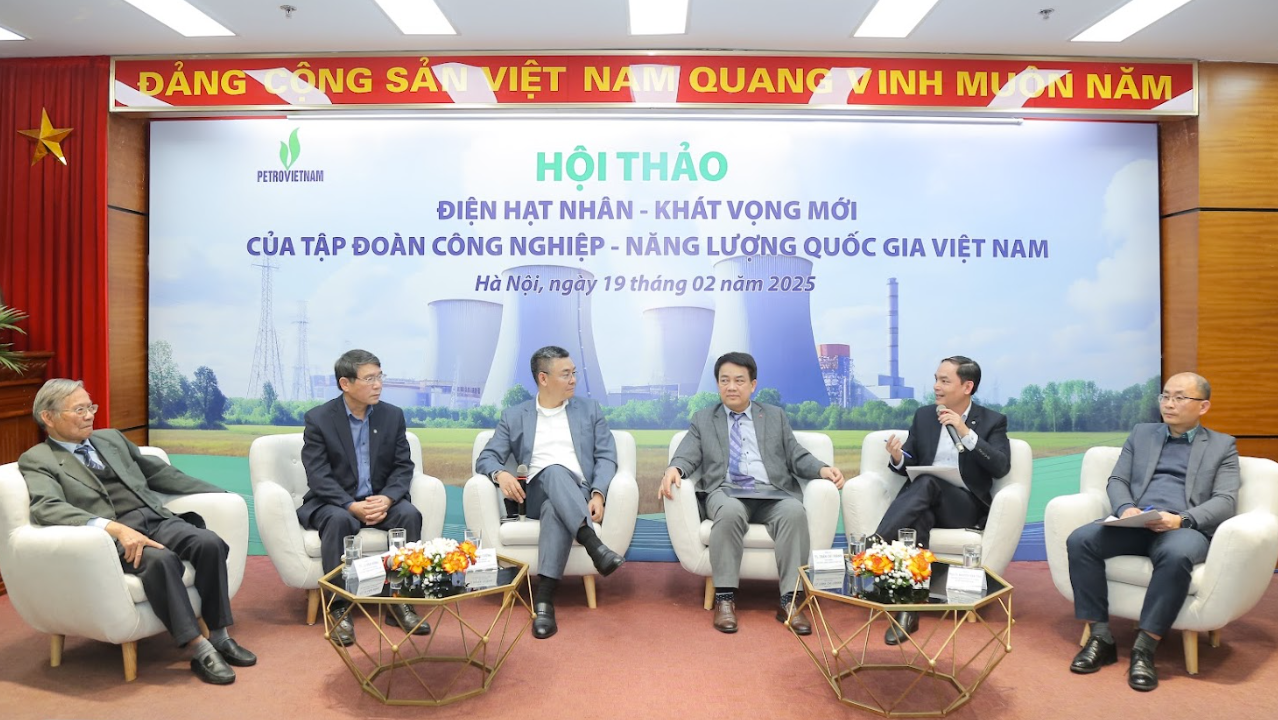 |
| The conference gathered leading experts in atomic energy |
Among the five major challenges of nuclear power - safety, economics, spent fuel management, nuclear non-proliferation, and public acceptance - safety remains the most critical. This includes controlling chain reactions, managing decay heat, and ensuring secure radioactive waste storage. Clarifying these aspects, Assoc. Prof. Dr. Nguyen Van Thai introduced the International Atomic Energy Agency (IAEA) safety standards, which ensure “suitable operational conditions, accident prevention capabilities, and minimized accident consequences, thereby protecting workers, the public, and the environment from excessive radiation risks.”
Economic viability is another key consideration in nuclear power development. Based on research on the average construction time of nuclear power plants worldwide, Dr. Hoang Anh Tuan suggested that Vietnam could explore ways to shorten construction periods to optimize costs. According to Dr. Tuan, nuclear power is cost-competitive compared to other forms of power generation, except in locations with direct access to low-cost fossil fuels. While nuclear plants have higher capital costs than coal-fired plants and significantly higher than gas-fired plants, their system costs are much lower compared to intermittent renewable energy sources.
 |
| Dr. Hoang Anh Tuan, former Director of the Atomic Energy Department: Vietnam could explore ways to reduce construction time and costs. |
"The construction of a nuclear power plant is a hallmark of large-scale infrastructure projects worldwide, involving substantial costs and formidable challenges. Therefore, it is essential to establish long-term capital incentive policies to ensure a diverse and reliable electricity supply system," recommended Dr. Hoang Anh Tuan.
Proactively Prepare, Strive for the Highest Readiness for Major Tasks
During the discussion session, Petrovietnam officials and engineers raised numerous questions regarding the IAEA's nuclear infrastructure assessment process, Vietnam's self-assessment of infrastructure preparedness, the recommended load factor for nuclear power plant operation, training strategies to quickly adapt to operational technologies, the legal and policy framework for nuclear power, and the challenges in meeting the Prime Minister’s directive to bring nuclear power into commercial operation within five years. These concerns were thoroughly addressed and discussed by leading experts in atomic energy and nuclear power present at the conference.
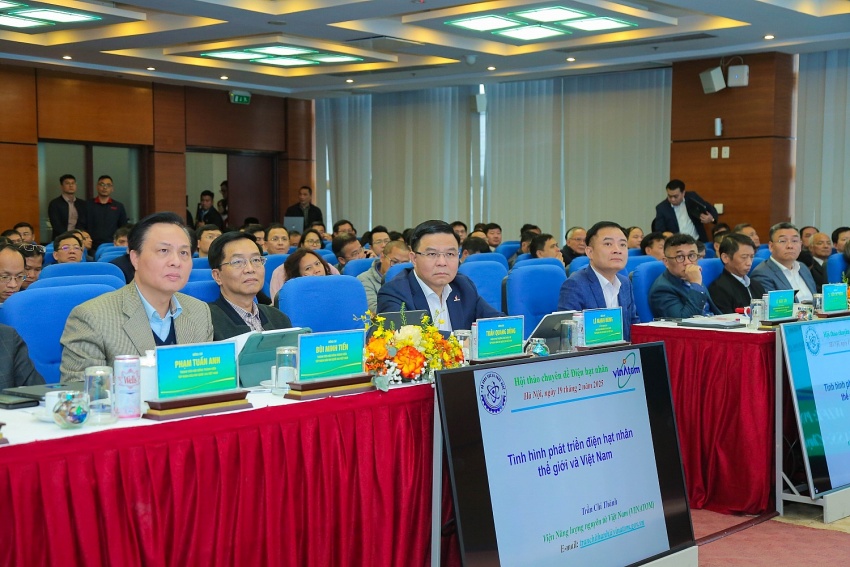 |
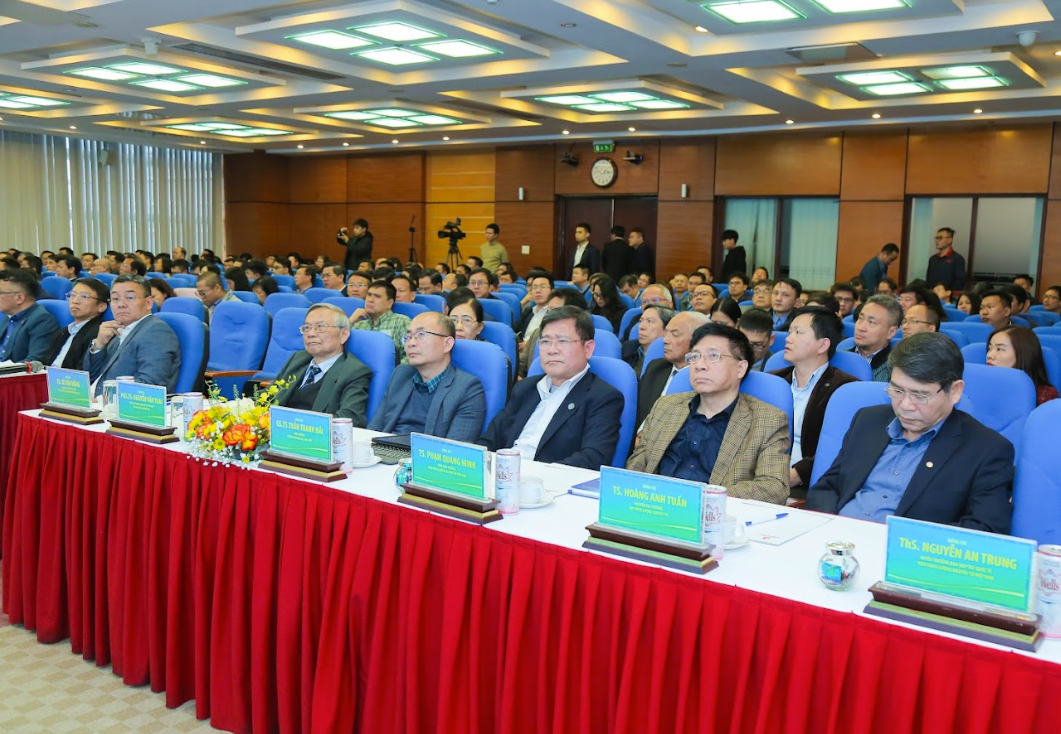 |
| The conference attracted leaders, officials, engineers, and technicians of Petrovietnam passionate about new energy sources |
Concluding the conference, Chairman of Petrovietnam's Board of Directors Le Manh Hung reaffirmed the Group's slogan: "Petrovietnam - Energy for Development." Energy, he emphasized, extends beyond oil and gas to encompass the broader national energy industry.
With Vietnam projected to become an upper-middle-income country by 2030 and a high-income country by 2045, the development of baseload power sources is of utmost importance. The goal, as directed by the Prime Minister, is to have a nuclear power plant operational by 2030 at the earliest and no later than 2031. Given the demanding nature of this target, special solutions are required. To support this, the National Assembly has approved a Resolution establishing exclusive mechanisms and policies for the Ninh Thuan nuclear power project. However, beyond these special policies, additional regulatory and investment frameworks must also be refined, particularly those applicable to the project owner.
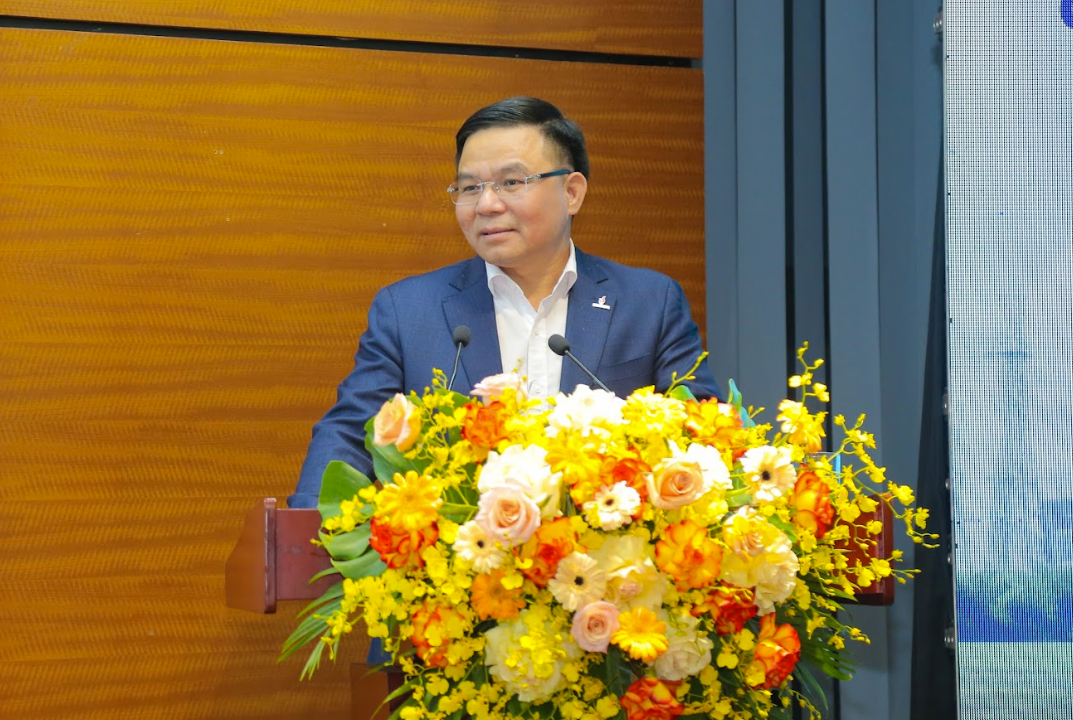 |
| Chairman of Petrovietnam’s Board of Directors Le Manh Hung: “The entire Group must proactively study and prepare human resources before being officially assigned the project by the State.” |
According to Chairman of Petrovietnam’s Board of Directors Le Manh Hung, based on Conclusion No. 76-KL/TW of the Politburo regarding Petrovietnam’s development orientations - which include the goal of transforming Petrovietnam into a National Industrial - Energy Group - the company is strategically transitioning towards this goal. As part of this strategy, Petrovietnam is gradually expanding into new energy sectors, including renewable energy and emerging energy technologies.
Given the national energy development requirements, Chairman Le Manh Hung has outlined five key focus areas for the Group's leadership, engineers, and employees in the coming period: First, continue research and propose mechanisms to optimize capital costs. Second, collaborate with experts to conduct self-assessments and select nuclear power technologies before making investment decisions. Third, focus on evaluating and selecting technologies based on safety criteria. Fourth, develop a well-structured human resource strategy, seek expert opinions, and establish an appropriate workforce structure for nuclear power plants. Fifth, explore financing solutions, including loan agreements such as export credit, while developing a sound financial framework and preparing resources to support the outlined development strategy. Additionally, a risk management matrix must be established for the nuclear power project, including strategic risk assessments, to ensure its successful and secure implementation.
"I call on all leaders, employees, experts, engineers, and technicians within the Group to strive for the highest level of excellence. With the goal of transforming Petrovietnam into a National Industrial - Energy Group, we must diligently study, maintain a strong learning spirit, manage risks effectively, and ensure the success and safety of the project when entrusted by the Government," emphasized Chairman Le Manh Hung.
The organization of the conference by Petrovietnam clearly demonstrates the proactiveness and strong political responsibility of the company’s leadership and workforce in tackling the challenging mission entrusted by the Party and the State. Petrovietnam's determined and proactive approach is not only reflected in the swift organization of the conference but also in its methodical, scientific, and strategically driven approach. In the context of Vietnam accelerating its energy transition, the successful implementation of the nuclear power project will mark a significant milestone, bringing the country closer to its sustainable development goals and the modernization of its energy sector.
| On the morning of February 19th, the National Assembly passed the Resolution on several exclusive mechanisms and policies for investing in the construction of the Ninh Thuan nuclear power project with overwhelming approval. This Resolution outlines key measures that demonstrate the State's strong commitment to implementing this nationally significant project. The Resolution specifies the stakeholders involved, including government agencies, Ninh Thuan province authorities, project owners, designated project preparation units, and other relevant organizations and individuals. Notably, regarding mechanisms and policies, the Resolution clearly states that the project will be subject to special mechanisms, such as simultaneous negotiations with partners who have signed international treaties or other potential partners to sign new international agreements on construction cooperation and project financing. These negotiations will be carried out in parallel with the approval process for investment policy adjustments and project investment approval. In terms of investor and contractor selection, the Prime Minister has authorized the project owner to directly appoint contractors under an expedited procurement process for the turnkey package to construct the main power plant with contractors specified in international treaties. The procedures for direct contractor selection under this expedited process will comply with the Law on Bidding. Regarding the financial plan and capital arrangements, the Resolution specifies that negotiations will be conducted with the governments of partner countries to secure project financing, aligning with the project's funding needs and commitments from international lenders. The project will be allowed to apply foreign lenders' regulations in cases where Vietnamese law does not yet provide provisions or differs from the foreign regulations. Additionally, the project owner will be eligible to borrow funds under a non-credit-risk re-lending mechanism, eliminating the need to formulate separate proposals for ODA loans or concessional foreign loans. During the project's execution, the Prime Minister has the authority to allocate additional funding from increased government revenue, budget savings, and other legal capital sources if negotiations on loan agreements do not succeed or if the negotiated loan amounts are insufficient. The project owner is also permitted to arrange counterpart funding from loan capital, corporate bonds, re-borrowed funds from government bonds, infrastructure bonds issued by the government, and government-guaranteed bonds. The re-lending terms will be based on the borrowing conditions of the bond issuance, the project's debt repayment capacity, and the Law on Public Debt Management. Furthermore, the Prime Minister has approved a charter capital increase for the project owner, funded by revalued depreciated assets from BOT power plants that have been transferred to state ownership and multi-purpose hydropower plants. The additional capital will be equivalent to that of a nationally significant project. Authorized agencies responsible for re-lending ODA and foreign concessional loans will not be required to assess the project's eligibility for re-lending, in accordance with Clause 3, Article 36 of the Law on Public Debt Management. Previously, on February 4th, during the 2nd Meeting of the Steering Committee for Nuclear Power Plant Construction, Prime Minister Pham Minh Chinh assigned the Ministry of Industry and Trade to report to the relevant authorities regarding the appointment of EVN (Vietnam Electricity) and Petrovietnam as the project owners for Ninh Thuan Nuclear Power Plants 1 and 2. |
-

Petrovietnam là doanh nghiệp tiêu biểu cho tinh thần “Doanh nghiệp dân tộc - Vì lợi ích quốc gia”
-

Khám phá cung đường Marathon Cà Mau 2025 - Cúp Petrovietnam
-

Công đoàn Nghiên cứu Khoa học và Đào tạo: Đẩy mạnh thi đua sáng tạo tài sản trí tuệ cho Petrovietnam
-

Công đoàn Ban QLDA Long Phú 1: Đổi mới - Sáng tạo - Vì người lao động - Vì tiến độ công trình


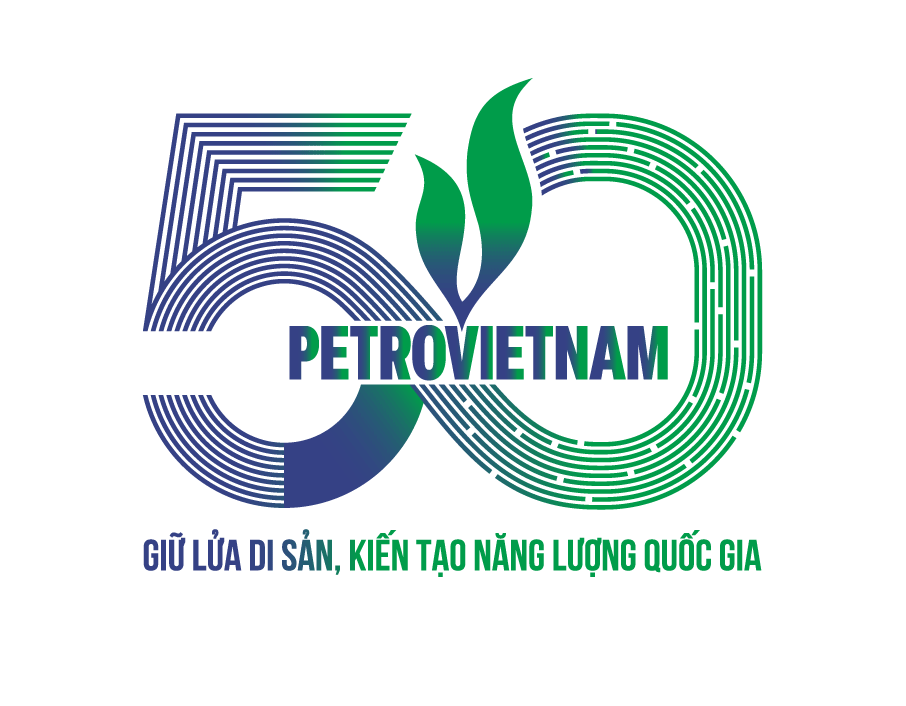














![[VIDEO] PVPMB và Công an TP Cần Thơ ký kết Quy chế phối hợp đảm bảo an ninh, an toàn Dự án Ô Môn IV](https://cdn.petrotimes.vn/stores/news_dataimages/2025/102025/22/18/thumbnail/ky-ket20251022182524.jpg?rt=20251022182526?251022062550)

